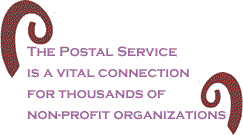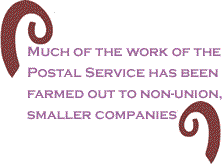The
recent announcement that the U.S. Postal Service is going
to ask for an increase of two cents for a first class stamp
and is considering closing of post offices and delivery
on Saturdays should alarm citizens who are advocates of
free speech and open communications in America.
It
isn�t just the two-cent increase, from 44 cents to 46 cents
to mail a letter or the increase to 30 cents to mail a post
card. The citizens� concern should be directed to what the
post office has become, from what it once was.

The
office of Postmaster General is older than the republic.
Benjamin Franklin was the first to hold the position and,
from 1829 to 1971, postmaster general was a cabinet-level
position, indicating the importance of the U.S. Postal Department
or the �Post Office.�
Most
Americans would not even think about roads being vital to
the communication system of the nation, yet they were the
link among the 13 colonies. Mail was carried on horseback
by pouch, or delivered by stagecoaches, as they careened
from one city or village to another. It was primitive, but
it was the vital link among the citizenry.
Post
roads were designated by the postmaster general and the
department even built some of the roads and maintained many,
so the letters, newspapers and other documents and papers
could be delivered, debated and acted upon by the various
groups of citizens and governing bodies around the colonies.
Article
I, Section 8 of the U.S. Constitution specifically mentions
the post offices and post roads, so it was something that
the founders thought was vital to the health of a democratic
republic, if one were to continue throughout the generations.
Elements
in the political life of the nation - individual and organizational
- have made it one of their goals in life to reduce the
functions of government. Thomas Jefferson mentioned that
a small government would be the best government, but he
didn�t say that this was the only thought to hold regarding
government.
 But
some sects within political parties and some without party
have come to understand Jefferson�s view, carried to the extreme, is the way government should
be. Grover Norquist, an anti-tax, anti-government crusader
has said that he and his cohort don�t want to eliminate
government altogether, but they just want to make it �small
enough to drown in a bathtub.� But
some sects within political parties and some without party
have come to understand Jefferson�s view, carried to the extreme, is the way government should
be. Grover Norquist, an anti-tax, anti-government crusader
has said that he and his cohort don�t want to eliminate
government altogether, but they just want to make it �small
enough to drown in a bathtub.�
The
conversion of the Postal Department from a cabinet-level
agency to the �U.S. Postal Service� was a way station on
the road toward privatizing or contracting-out any service
of government that could be converted. In 1970, the transformation
of the USPS into a private corporation had begun.
Since
it was organized like a private corporation, it needn�t
be supported by government any longer, right?
This
past week, when the USPS announced that it would be seeking
an increase in the price of a first-class stamp, Stephen
M. Kearney, postal vice president, told the Associated Press,
�The Postal Service faces a serious risk of financial insolvency.�
Last
year, the service �lost� $3.8 billion, even though it slashed
tens of thousands of jobs across the country. This year,
it faces a loss of about $7 billion and an equivalent loss
is expected in 2011. The U.S.
government and the USPS (the corporation) can use those
terms, because, essentially, they have turned a public service
into a private company.
 In
recent history, the U.S. has seen a massive effort by right-wing
think tanks and their stables of popular writers to move
the country to deregulate, privatize, contract-out, or otherwise
eliminate any government role in providing services. This
has occurred in transportation (especially public transit
and rail), water and sewage treatment, utilities, defense
and the military, education, and most recently, health care.
In the last instance, the effort to keep the insurance industry
in complete control of health care was fully bi-partisan.
And, they succeeded. In
recent history, the U.S. has seen a massive effort by right-wing
think tanks and their stables of popular writers to move
the country to deregulate, privatize, contract-out, or otherwise
eliminate any government role in providing services. This
has occurred in transportation (especially public transit
and rail), water and sewage treatment, utilities, defense
and the military, education, and most recently, health care.
In the last instance, the effort to keep the insurance industry
in complete control of health care was fully bi-partisan.
And, they succeeded.
The
Postal Service is a vital connection for thousands of non-profit
organizations, which are in many cases the only alternative
voices that some Americans hear. All of this goes into the
mix of a vigorous debate on public policy and the progress
of the nation toward solution of some of its toughest problems.
As the price of mailing these newsletters and other communications
goes up, the number of them continues to decline or the
groups decrease frequency of publication.
As
the USPS prices rise, the more people and groups move to
other forms of communication, especially the Internet, which,
for now, provides free distribution. That will last, however,
only as long as Corporate America is kept out of the arena.
If corporations gain control of the Internet, the cost will
start out for pennies - similar to that of the old Post
Office Department - and rapidly escalate into incalculable
reservoirs of money.
Instead
of looking at the USPS as a public service, providing vital
support for political debate in a democratic republic, it
has come to be seen as just another business. That�s what
has been accomplished over the past 40 years. And, if it
is just another business, it can be bought and sold. Don�t
think that United Parcel Service or Federal Express haven�t
been eyeing the Postal Service as the next big project.

The
country�s right wing would prefer Federal Express, being
non-union, to the unionized UPS, but right-wingers certainly
would prefer that it be sold to a private company. Consider
that it�s in the works already.
For
years, moves have been made to move work out of unionized
Post Offices and into private �mail houses,� which often
have their own printing presses. The Postal Service over
many years has provided discounts for patrons who bring
their mailing to them ready to put into the automated system.
That way, no Postal Service (unionized) workers have to
do much to handle the mail.
Corporations
have taken advantage of this and have received deep discounts
for their solicitations, advertising, and junk mail that
clog up the postal system. That leaves the first-class mail
customers out of the equation, and they�re the ones who
are picking up the tab for the corporate mail. Either that,
or the Postal Service runs up the great debt that they have
announced in recent years.
Also,
the USPS has been billed - some $5 billion a year - for
the retirement benefits of the workers of the old Post Office
Department. According to AP, the USPS avoided further financial
disaster last year, when Congress allowed it to delay $4
billion of that annual payment.
Even
though much of the work of the Postal Service has been farmed
out to non-union, smaller companies and it has been automated
to the maximum extent, the service cannot seem to make a
profit. Should that be one of its goals?
 Should
a profit be made on schools, colleges and universities,
municipal water systems, highway systems, railroads? All
of the services necessary to a vigorous and healthy democratic
society are in danger of being sold off, mainly because
of the relentless propaganda campaign against government
and any services that we expect it to provide. Should
a profit be made on schools, colleges and universities,
municipal water systems, highway systems, railroads? All
of the services necessary to a vigorous and healthy democratic
society are in danger of being sold off, mainly because
of the relentless propaganda campaign against government
and any services that we expect it to provide.
To
be sure, government can be used to intrude on private citizens,
such as we have seen happen over the past dozen years, or
more - the US PATRIOT Act immediately comes to mind - but
where it should intrude, it doesn�t seem to be able to lift
a finger.
Government�s
role, according to at least some of the founders, was to
provide protection of all the citizenry from the depredations
of the powerful. In that, government has failed (witness
the disparity in wealth and the misery of the people in
our Great Recession).
The
Postal Service�s travails are but one example of the problems
faced by the people in finding a better way, but if the
answer is to sell off the estate to any bidder, on the premise
that it is more efficient, there is more trouble afoot than
anyone believes. How much control over the giant corporations
that rule our economy does the average citizen have? At
least, if government (that�s us) is in control, there is
an opportunity, through the political system, to have an
effect on policies and the outcomes of those policies.
Without
political awareness and action by the people, there will
be little opportunity to affect how we live our lives. By
selling off massive amounts of government service, like
the Postal Service, Americans inexorably and steadily lose
their rights and their government becomes just a shell.
BlackCommentator.com
Columnist, John Funiciello, is a labor organizer and former
union organizer. His union work started when he became a
local president of The Newspaper Guild in the early 1970s.
He was a reporter for 14 years for newspapers in New
York State. In addition to labor
work, he is organizing family farmers as they struggle to
stay on the land under enormous pressure from factory food
producers and land developers. Click here
to contact Mr. Funiciello. |

